In what could be termed as junk, one man finds collectible treasures. THEO PANAYIDES speaks to a permanent expat rescuing Cyprus’ modern history one discarded landfill piece at a time
Julian Howard looks around, as if wondering what to do for an encore. (We’ve been chatting in his tiny shop, Riverside Studio in old Nicosia, for over two hours.) “I’ve even got water from the Jordan river!” he exclaims, his eye alighting on something – then grabs a small vial from one of the crowded shelves and there, indeed, is a date (1986) and a label in Greek, ‘frear Iakov’ which (I find out later) is Jacob’s Well, a Christian holy site in the West Bank. The bottle is half-full of water, the rest having presumably evaporated in 37 years. It sparkles now and then, adds Julian mysteriously.
The holy water comes as a final flourish – though it’s not like we needed any more astonishments; the whole shop seems to deal in the weird and wonderful. “This is amazing,” says Julian, leading the way, “this is one of the amazing things… This is a letter to the milkman in Nicosia, and it’s on colonial letterhead, and it’s from 1921”. The handwritten note is addressed simply ‘To the Milkman’, dated July 2, 1921 and signed ‘G. Jeffery’: “Please supply Mrs Jeffery with 1 oke of milk per day until further notice”. The letter (he explains) is from George H Everett Jeffery, antiquities expert and Curator of Ancient Monuments in the first decades of the 20th century; Julian found it at a house clearance, folded in a book among the rubbish in a house that was about to be sold. It’s unclear who the house belonged to, though it obviously wasn’t G Jeffery (who died in 1935) or the milkman. It’s also unclear why Mrs Jeffery didn’t write the letter herself – but perhaps it was considered inappropriate for the wife of a colonial nabob to be corresponding with a mere milkman.
Not everyone would agree that an old letter with no useful content counts as ‘amazing’ – and that’s okay too. “I quite accept the fact that people look at this and call it junk,” says Julian mildly, ‘this’ meaning all his various treasures. “And they’re absolutely right.” The shop isn’t, let’s be clear, an antiques shop, nor is it like the shop – also called Riverside – which he previously had in Bahrain specialising in furniture repurposing, buying old Arabian doors and working with a carpenter to convert them into coffee tables and such. This incarnation of Riverside is small (he’s looking vaguely for a bigger shop), only open a few hours a day and thoroughly packed – “I deal in millimetres here” – with apparently random objects. ‘The Micro-Museum of Everything’ reads a sign on the pavement outside – though no “bric-a-brac”, appends Julian firmly.
What’s the difference?
“Bric-a-brac is basically if you’re looking for – y’know, some teacups or mugs, or a chair… Stuff you find in secondhand shops, from people’s kitchens.” The point, I suppose, is that bric-a-brac is generic – whereas Julian features items which have “some sort of collectible value. Intellectual value, you could say”.
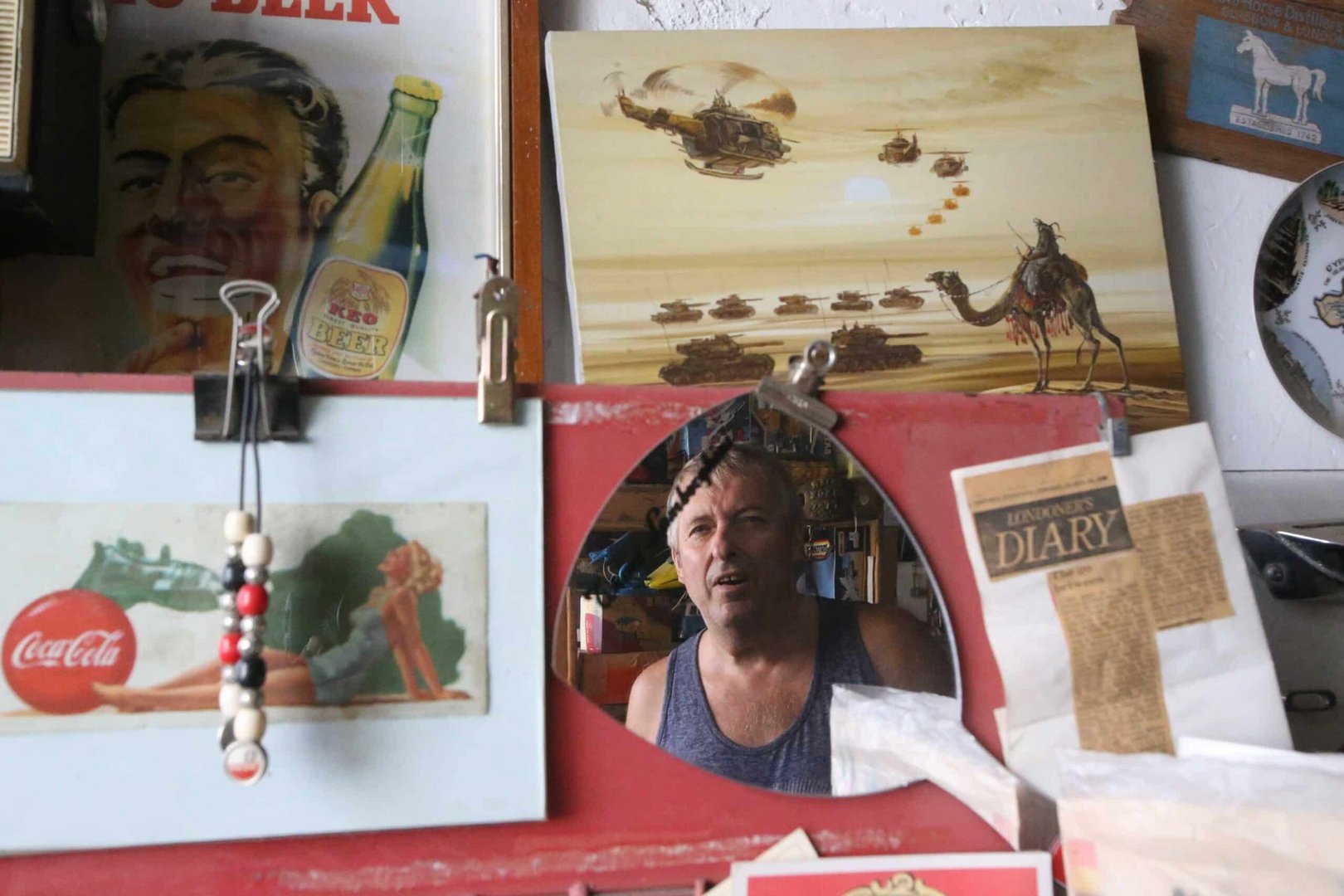
His personal story tends to commingle with the story of the shop, indeed many of the items on the shelves have personal significance. There’s a rack of cassette tapes, and they are in fact his old cassette tapes – ostensibly for sale though no-one ever buys any, he just listens to them on an old tape deck sometimes. “I have a lot of John Peel radio shows,” he says, Peel being the legendary DJ who specialised in obscure indie stuff, “they’re mine and my brother’s. He was the punk in the family, he was also the anarchist. He had green hair, and a Mohican and all that – he got photographed walking down the King’s Road all the time”.
Also on display is a cutting from Anarchist magazine dated 1989, also in honour of his brother (who died young, in 1990), just as the books in a corner of the shop are part of his mum’s extensive book collection. “Mum was a journalist, a writer – and not a bad opera singer, actually.” She’d often embarrass her children by walking around the house singing along with the BBC – please stop, they begged, “our friends think we’re mad” – then moved to Paphos in the late 70s (she and Dad were estranged at the time, though he joined her later). Julian’s choice for the single most extraordinary item in the whole shop is another letter, which he unearthed in boxes of correspondence that had once belonged to journalist Alex Efthyvoulou of Cyprus Weekly fame. They included telex copies of stories he’d filed with the BBC pre-invasion, which is fascinating in itself – but also, “going through the boxes, I found a letter from my mum! How about that?”. His mother wrote to Efthyvoulou in the mid-80s, asking if they could use a Paphos correspondent. “What’s the chance of finding, in a skip, a box of documents, and then finding a letter from your mum in there?” marvels Julian. “I mean, how can that actually happen?”
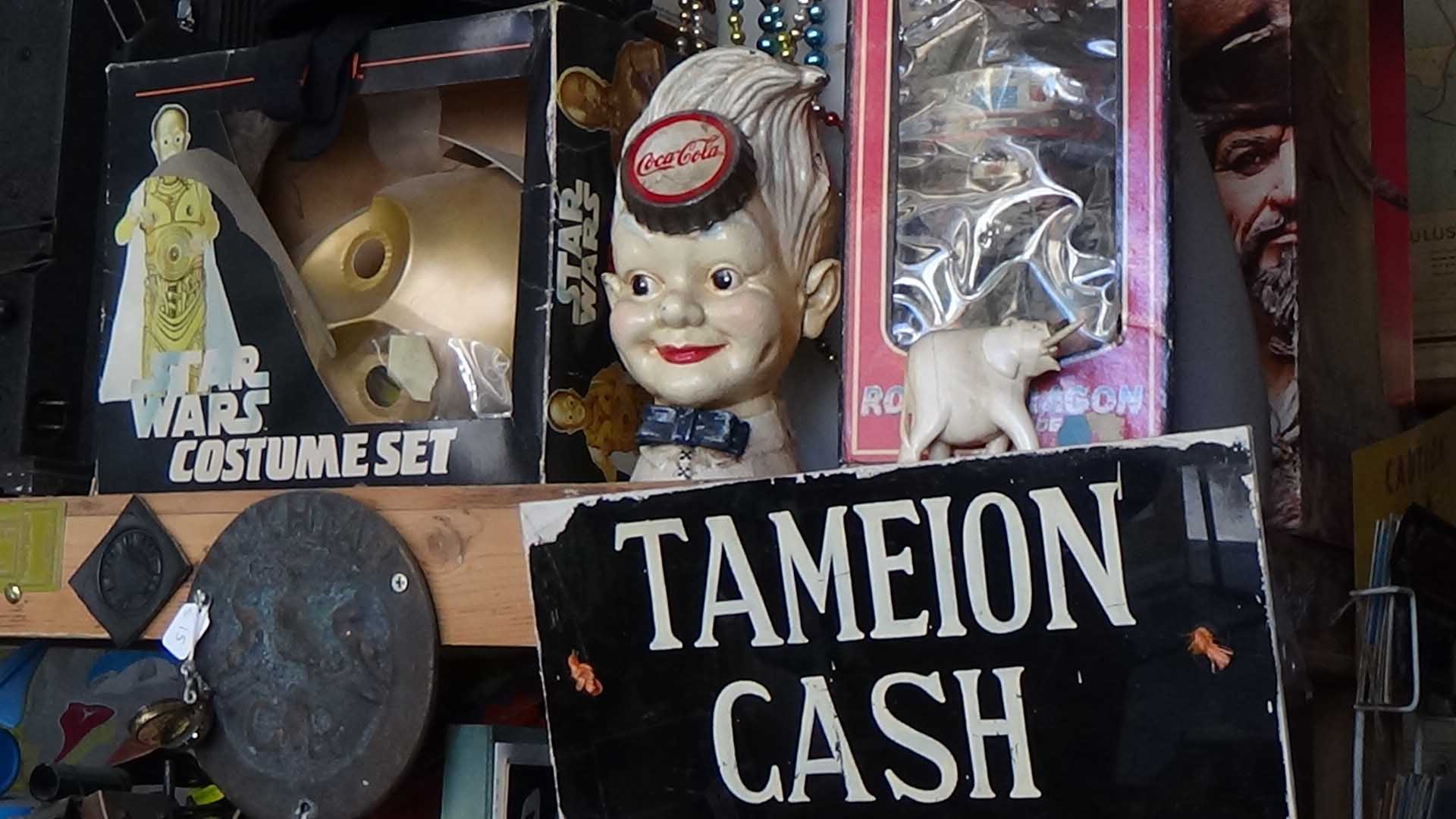
There are toys – a robot, a jigsaw puzzle. There are decks of cards, one rather beautiful deck that would probably go (he says) for €15-20, but also ordinary decks of casino cards. There’s an old curfew pass from Eoka days, the aftermath of a criminal case against a Mr Papapetrou who owned a bread factory and was convicted of breaking curfew. (He pleaded that his working hours left him no choice, and was duly issued with the curfew pass.) There’s an old 1MB floppy disc, repurposed as a clock. There’s a grandfather clock, probably the most expensive item in the whole shop. There are metal signs – ‘MIND YOUR HEAD’, ‘Coiffeur’. There are advertising leaflets (‘Discover the Real Jordan’) and film posters. There are Coca-Cola cans in various flavours. There’s an actual wasps’ nest (minus the wasps), an Anorthosis sign and a cartwheel off a colonial gun carriage – but also very ordinary things like coffee cups, cigarette lighters, rotary-dial phones, tickets for Tivoli Luna Park in Nicosia. I run my hand over a half-dozen white plastic discs which I take to be coasters – but they’re actually Petri dishes! Who’s going to buy old Petri dishes? Unless they plan to use them as coasters.
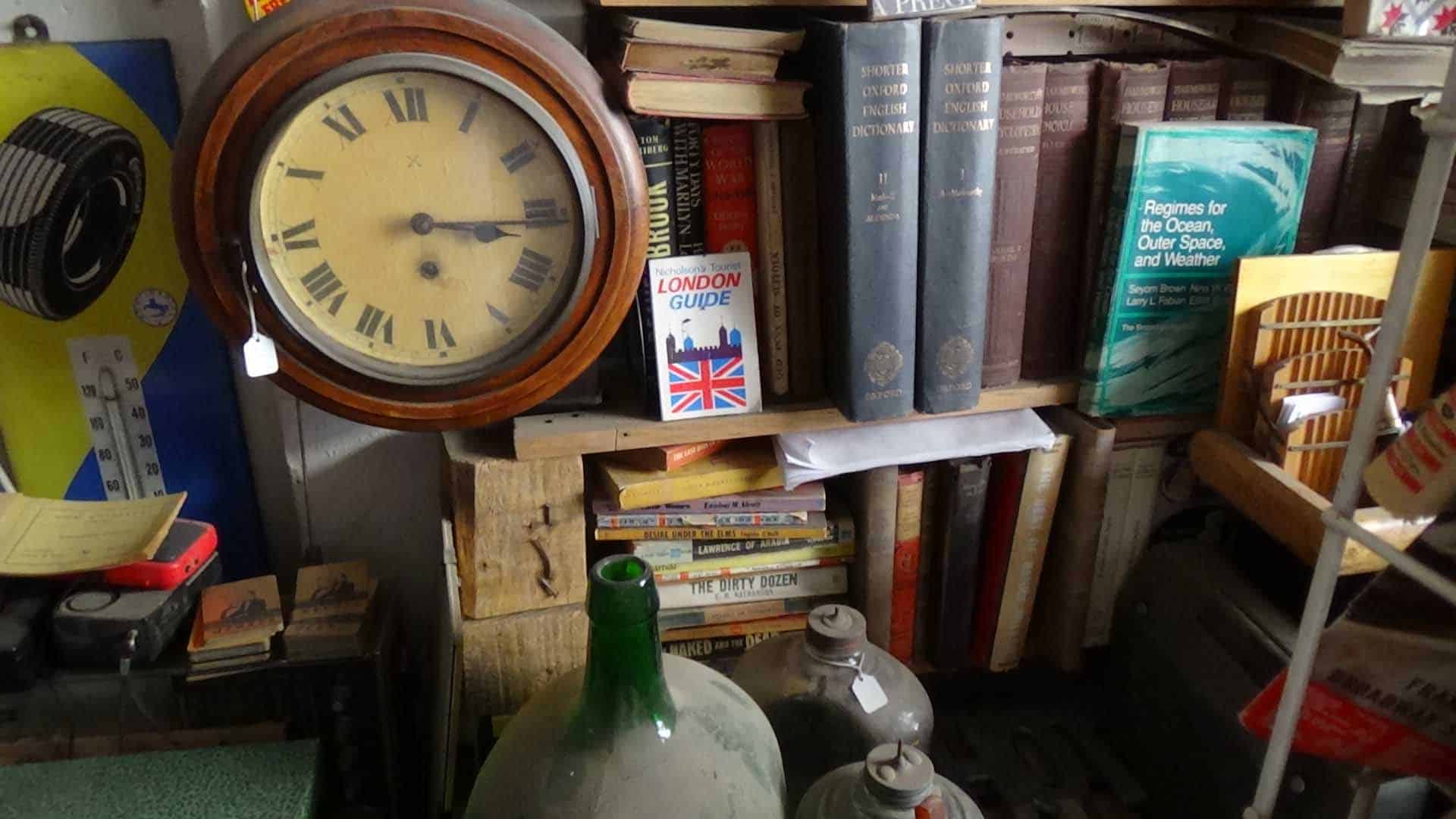
That raises another question, tying in with the underlying question of ‘Why does he do it?’. Is Julian one of those people who dwell on the past because they’re unhappy with the present? Is he nostalgic for the good old days? “No, I’m not,” he replies at once. “I am professionally – and respectfully. But no. I mean, we’ve got to live for today, in the hope that we can get tomorrow in as well.” His values skew more Labour than Conservative (or conservative), climate change being the cause dearest to his heart – others include animal rights and nuclear disarmament – though of course some things were indeed better back in the day, before mass production and everything becoming more uniform.
Why does he own this rather unusual place, though? Is he just a hoarder? Is it a sly continuation of his old career in advertising? (Brands are brands, after all.) I even wonder if it speaks to him in a subtler way, this tangible vision of the past making up for the fragmentary nature of his own past, as a permanent expat – but he shakes his head. “There’s no reason that I have this shop,” says Julian with a touch of impatience – or, if there is, it’s a practical reason. “I want to work. I want to get up and go to work every day. I don’t want to retire at home, in a small garden – I want to work. This is the best job I’ve ever had… And, if it can also provide me a modest income, even better.” Each day is different, every day he finds something new – right now “I’ve got a 1931 X-ray machine”, so he’s studying the history of radiology – then again “it doesn’t require so much work. So I can do this till I die”.
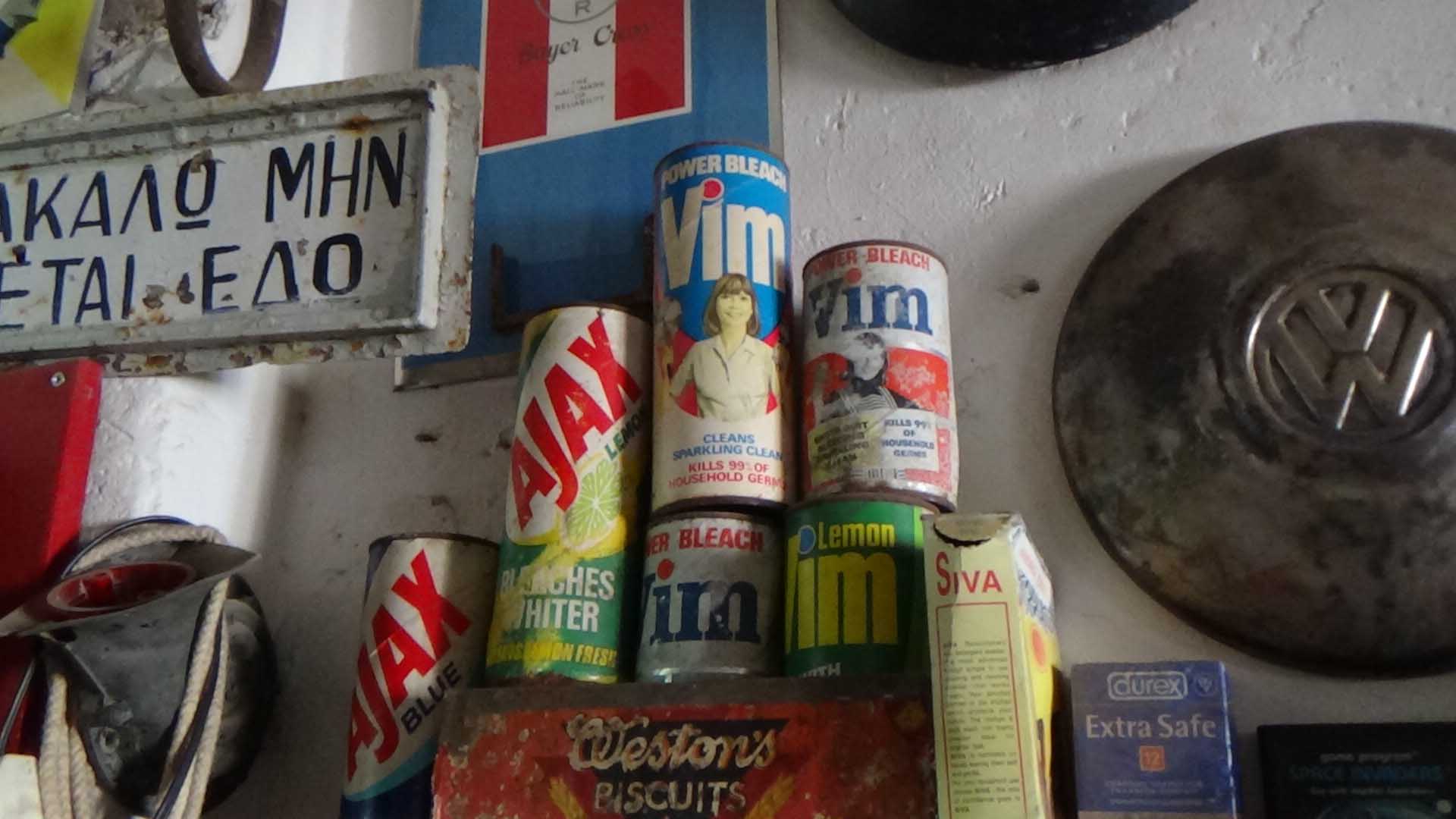
True enough – yet there’s also an anarchist streak, and it comes down to family. “We are a family of – not nonconformists, but challengers,” he explains. “We – Mum, Dad – we didn’t agree with the state on issues. On education, or banking. There’s always been, in the family, this thread of – well, nonconformist I suppose, or even what d’you call it? What’s the old word? ‘Bohemian’.” Easy to imagine Julian as the sensible one in a family of green-haired punks and opera-singing mums – and this shop, the shop of his later years, as a kind of loving tribute to the old family culture. An anarchist shop in the wider sense, a shop of random artefacts and odd juxtapositions. A shop where anything goes.
Like what? Well, an ark, for instance – an actual ark, about four feet long, discovered full of water from being left out in the rain, and who can say what it once contained? “The 10 commandments, perhaps?” asks Julian earnestly. “I mean, why wouldn’t they have been in Cyprus? They were in Jerusalem. No-one’s ever found them.” Then we have old passports, long since expired but still with their details and airport stamps. Or how about a set of Lover’s Fun Cards? (“If you are too shy to talk, these cards will yell for you.”) A wooden model – a so-called shoe last – of a British officer’s knee-high boot? A ‘Mukhtar of the Gypsies’ rubber stamp from a rubber-stamp factory opposite what’s now the Sewage Board, part of the now-defunct life of the old town? A collage of receipts from various Armenian merchants? A picture frame? An ice-cream scooper? A Guide to Nicosia from 1940? Did we mention the vial of water from the river Jordan?
Julian Howard has made notes for our meeting – he’s that kind of person, despite the anarchist streak – and now checks those notes: he was thinking about a mission statement for his shop, he says, and wondering what it might be. “And it’s basically: ‘Rescuing Cyprus’ modern history, one discarded landfill piece at a time’. Because I’d say that at least 60 per cent of this stuff in my shop would be going straight into the garbage somewhere. And I’ve saved it”. He looks around, shaking his head at the profusion of – well, junk. What’s he going to do with it all? “This is my dilemma,” he sighs. “I can’t die and leave this to my family to sort out!” So many things, just random things – and useless things, and amazing things.

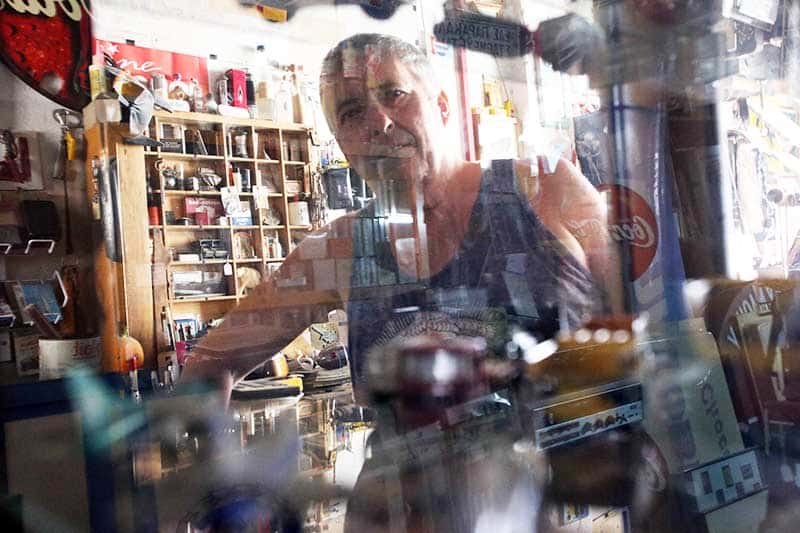





Click here to change your cookie preferences